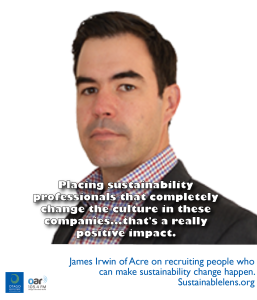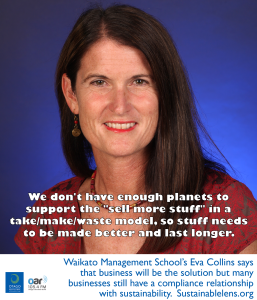Take time out to think about what you are doing, and once you’ve set that goal the world will conspire to help you.
Acre is considered the global market leader in sustainability recruitment and related services. We turn the tables on manager James Irwin to talk about his own career, and where he sees the future of the sustainability professional.
Talking points
0:02:51 I thought the two go hand in hand, and still do, sustainability and commerce
0:03:08 Without understanding peoples’ motivations it is extremely hard to think about and to get change
0:03:18 To me that’s the key to sustainability – to make people care, and if they care they’ll do something about it.
0:03:30 The world we live in, a lot of people are driven by capitalism, the commercial side, so understanding both sides is critical
0:04:17 Everything turned out to be the complete opposite of what I thought it was, economics wasn’t precise answers, it was this is what people think and this is what the drivers are, whereas ecology, that I thought would be more subjective, was completely objective – facts, figures and scientific study
0:09:03 I really wanted to combine sustainability with sales, and business development…Acre kept on popping up
0:10:00 Acre…recruits across the sustainability space
0:10:06 The term sustainability means so many different things to different people, often for two people in the same company
0:12:11 Somebody who is, say, a marketing manager in a renewable energy company, are they sustainable, or just doing a job in a sustainable company, and does it matter to us? And does it does matter to us.
0:12:34 So we define two roles… dark green – that you can only do if you are sustainability professional, and light green
0:13:00 (can you be a sustainability professional in an unsustainable company?)….Yes…We’ve put sustainability professionals in tobacco companies, arms manufacturers, alcohol companies… from our point of view, if we can put a sustainability professional in that completely changes the landscape…
0:13:47 If we can put in a sustainability professional that completely change the culture in these companies…then that’s a really positive impact.
0:14:07 If we can make a positive impact in companies that might might be perceived as less sustainable, then that’s a good thing.
0:15:28 We’ve haven’t turned down anyone…but definitely we are prepared to take that call.
0:15:41 (what if it is clear it is just greenwash?)…We’re not privy to internal decisions…but from a candidate perspective an important question is where does the role report to? For a lot of people that’s the key to unlock if it is greenwash or genuinely a role where they want change to happen…We also get asked if the company is looking for greenwash or looking for genuine change to happen. But for me both those questions are null and void. Sustainability, health and safety – this whole space that we are in is about change
0:16:35 …making change happen. For me it doesn’t matter if the company is getting forced to recruit a sustainability CR team because of their shareholders or whatever the reason is, but if you can get the foot in the door, if you can go in there and create some projects and really show the business that it’s not one or the other – its not business performance or sustainability, they’re symbiotic, they go hand in hand.
0:17:05 Demonstrating that more sustainable business perform better, that’s the only way that sustainability is going to get a true foothold in the business world.
0:18:10 go with that…once you’re in there you have the opportunity to influence the board room, for us that’s the making of the best sustainability professional – t’s not “can they influence other sustainability professionals?”, it’s “can they influence the CFO, the CEO, the head of operations ?”
0:18:44 As the market matures, the influence and engagement is absolutely what’s important.
0:21:06 As you get into the top end…the technical skills become less important, and the soft skills become important, influencing, engaging, leadership and change – change is the big one.
0:22:33 Embedding sustainability in supply chains is a current trend
0:22:52 A core sustainability team might create ideas…but then the business has to own it. Unless they influence, engage and drive change then nothing will really change.
0:23:42 Acre365 is all about impacts… in the first year of their role.
0:25:14 (Common feature of success) Making ideas happen, making change happen
0:27:45 Sustainability is perhaps about doing itself of a job, making sustainability and corporate responsibility business as usual. But that’s only to a point, we need to think, we’re here now, what’s next…? And having that core hub of excellence sustainability is set to continue.
0:28:29 Another trend, that has been a surprise it has taken this long, is leveraging core business around sustainability
0:29:19 (Definition of sustainability) has to include business world, environment and people. Sustainable for business and ethical and environment
0:30:40 Such a big challenge (timescale of return on investment), something might have a return on investment of ten years, but those businesses want to operate at fast pace – they want to see a return tomorrow.
0:31:18 I’m hoping that we’ll see more data sustainability/profitability (like the McKinsey report on diversity and profitability)
0:32:41 Being a change agent has to be primary core linking people together, the best candidates we place
0:33:23 How do they influence the boardroom to change the perspective from the next quarterly report, to the next year, five ten, to 500 years- its huge challenge, possibly one of the biggest challenges in sustainability
0:33:46 It will happen when businesses understand that its not mutually exclusive
0:33:52 How do you link short term profit with long term sustainability?
0:43:55 We’ve never been busier, so hopefully, if we’re reflecting the market it’s a great sign for sustainability – we’re a bit of a litmus test.
0:44:46 We’re seeing some inspirational business models…where we need to get to as a sustainable society, looking as supply chain, social equity – Im not seeing in my lifetime those all being overcome, but as with any goal you have to put into bite sized chunks.
0:45:47 Compared to the 1990s, businesses are more sustainable
0:46:53 Good things happen in local communities, one of the challenges of sustainability is big cities
0:49:35 (Success) Growing the business
0:50:06 (Activist) I my own way I think I am, I have a vision of where I’d like society to be, I I’d hope that I’m using my skills at the moment…the best to influence people and in some part make that vision a reality
0:50:47 (Motivation) Helping to grow the business, being part of something new, sustainability, ideas, action…we embody all that at Acre and we place people that embody that.
0:51:20 Challenges: Keeping in tune with the market, what does sustainability mean – and it moves so quickly and we have to stay at the front of that, that’s hard to do – we have to be out there leading but also taking a step back to reflect and know what you are doing.
0:52:24 (Miracle) to give people the opportunity to understand the impact of their buying decisions. I think people are good people, but there’s a lot of forces out there that influence them. I’d like to see a product that could show people every time there are looking a buying something, this is the impact…
0:53:27 (Superpower) Time travel , taking people through time to see what impacts decisions had, seeing beaches covered in plastic in 20130 because of that thing you bought on holiday
0:54:37 (Advice) Spend time to think about what drives you and what motivates you.
0:54:44 I’ve had the benefit of talking with people throughout their careers, and I tend to find those who are truly happy…so seldom are those getting paid the most amount of money. Take time out to think about what you are doing, and once you’ve set that goal the world will conspire to help you.
This interview was recorded in London in mid-September 2015.



